"The Disciplined Pursuit of Less"
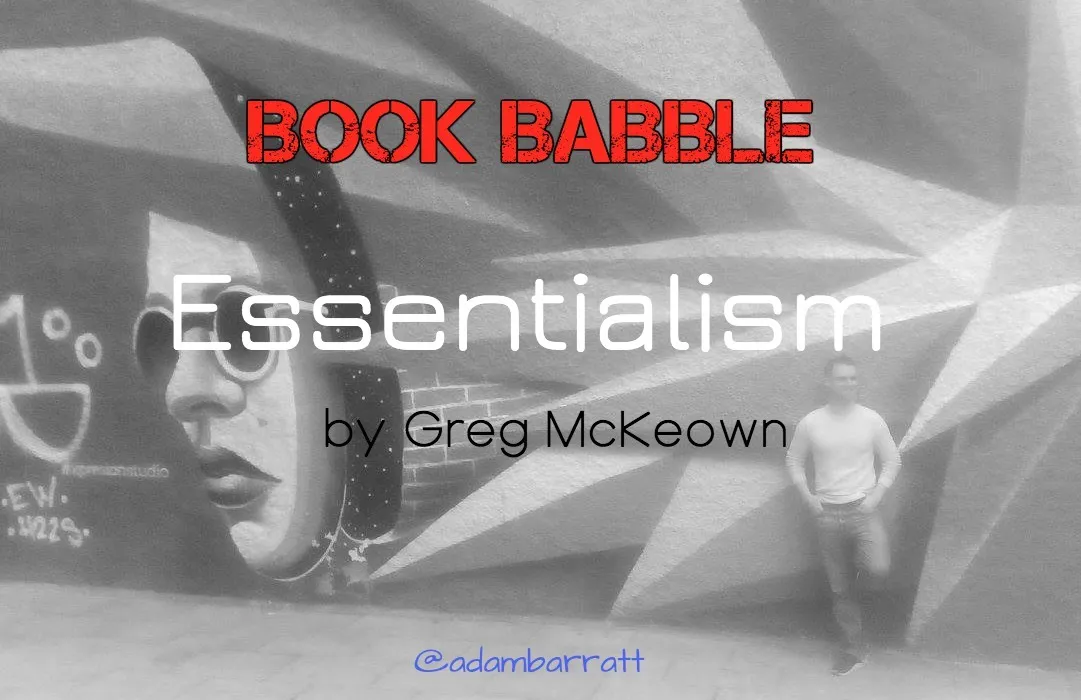
This is a great book on cutting out the fluff. Bringing everything back to its bare essentials, regaining focus and executing on the stuff that really matters.
Of course, we have so much going on, we're scattered all over the place and most of it isn't that important and is not getting us to where we want to be. It's about discovering what really does matter and finding ways to pursue that for optimum effect.
Getting down to the basics, prioritising and executing…
Top Takes From the Book + My Musings
THE WISDOM OF LIFE CONSISTS IN THE ELIMINATION OF NON-ESSENTIALS. —Lin Yutang
The central theme. In recent times, 'minimalism' has been all the rage, and with good reason. People are leaning towards having less stuff physically and concentrating more on experiences and 'spiritual' pursuits.
Is it use or ornament? If neither, perhaps time to get rid.
In this example is the basic value proposition of Essentialism: only once you give yourself permission to stop trying to do it all, to stop saying yes to everyone, can you make your highest contribution towards the things that really matter.
AKA spreading yourself too thin. You end up being nothing to anyone or anything, but with a bit more focus you can go much further and with higher quality.
German words: Weniger aber besser. The English translation is: Less but better.
Less is more. I'm sure a 'Mad Man' had something to say about that too…
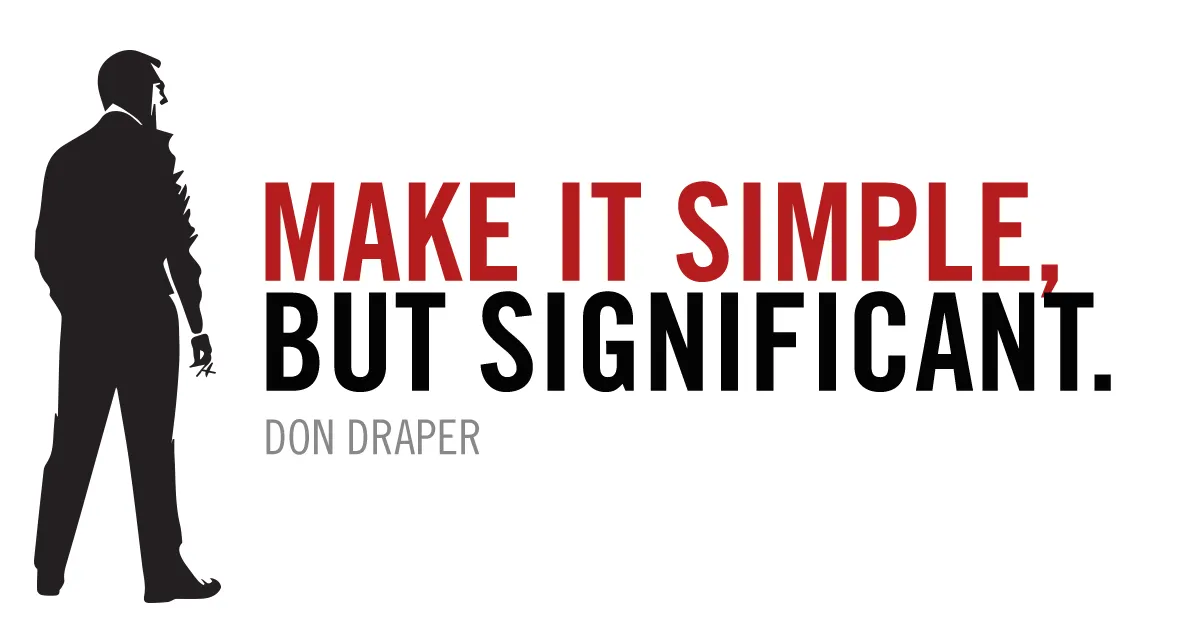
Essentialism is a disciplined, systematic approach for determining where our highest point of contribution lies, then making execution of those things almost effortless.
Taking these ideas and creating a more structured approach to the situation. Drilling down to what really matters, making a plan, then making it happen.
If you don’t prioritise your life, someone else will.
Somebody will put you to work, and it will be for their gain. This is about taking back control and becoming what you're supposed to be.
discern the vital few from the trivial many.
A nice quote summing up the central tenet.
The word priority came into the English language in the 1400s. It was singular.
This is an interesting one and shouldn't be glossed over. The word 'priority' originally only existed in singular. As in, the most important thing. You couldn't have more than one.
Priorities is a more modern invention, but we need to get back to the root. There can't really be more than one thing that's most important at a given time. Second or third on the list can become number one when it's their turn but having multiple things as the 'most important' is going to cause confusion, plus they may even contradict each other.
Prioritise the priorities!
“What do I feel deeply inspired by?” and “What am I particularly talented at?” and “What meets a significant need in the world?”
This reminds me a lot of Ikigai. I happened to have done a BookBabble on this, and is well worth a read. It's mainly about longevity and happiness and there is obviously cross-over here.
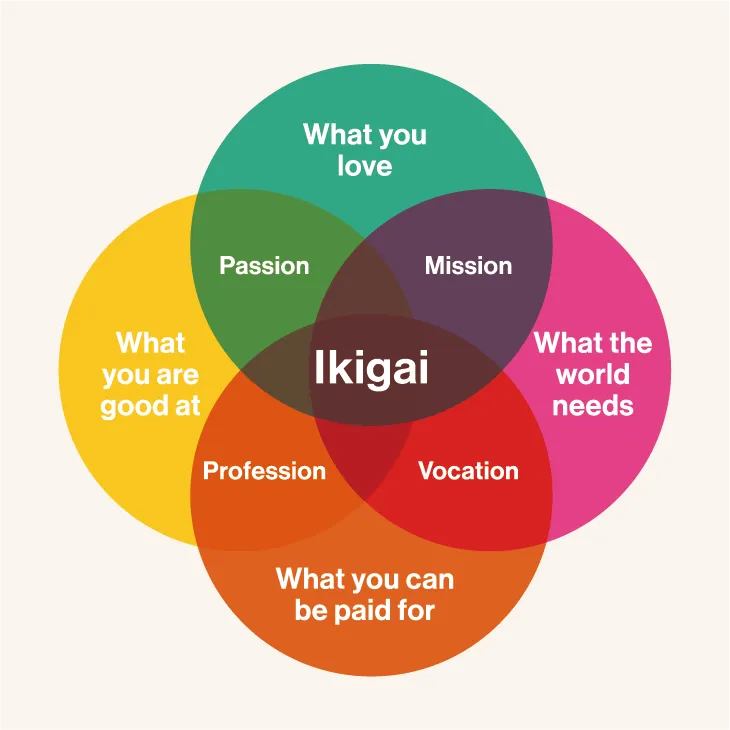
“I choose to,” “Only a few things really matter,” and “I can do anything but not everything.”
Everything is possible, but you can't do it all. Make sense?
“If you could do only one thing with your life right now, what would you do?”
If you really had to pick, what would you go for? How would that look and how could you make it happen?
while we may not always have control over our options, we always have control over how we choose among them.
Controlling the controllable, a common theme of these articles. Options may be out of our hands to a degree, but we do get to decide the most suitable from that menu.
learned helplessness
A state that occurs after a person has experienced a stressful situation repeatedly. They come to believe that they are unable to control or change the situation, so they don't try — even when opportunities for change become available. They've got used to it now and can't see beyond anymore.
Richard Koch, author of several books on how to apply the Pareto Principle (80/20 Rule) to everyday life.
Most will know all about the Pareto Principle (80/20 law) and this was a book based on that concept. This can also be applied in our essentialism quest!
“power law.” According to the power law theory, certain efforts actually produce exponentially more results than others.
That ties in directly with the 80/20 principle. Although that's not an exact science, there is definitely a majority that has the most impact… whether that's 90/10 or even 70/30, the point remains the same and it is nowhere near 50/50. Time to recognise what actually moves the needle and prioritise that.
As John Maxwell has written, “You cannot overestimate the unimportance of practically everything.”
Most things don't matter. They really don't. Over the course of time they fade away, as do many people or situations we thought were important. It's about discerning this before it's too late and acting on what really does matter instead.
The reality is, saying yes to any opportunity by definition requires saying no to several others.
Opportunity costs. Doing any one thing will mean not being able to do another. You have to get comfortable with that and realise that's part of the game. Then make the most of the choices you do make.
There will always be a trade-off, so it's about weighing that up and going for it.
To discern what is truly essential we need space to think, time to look and listen, permission to play, wisdom to sleep, and the discipline to apply highly selective criteria to the choices we make.
It can be hard to get to the bottom of it. Not least because we're so distracted all the time. Having that quiet reflection to be able to relax and let things flow, should allow us to assess and act accordingly.
WITHOUT GREAT SOLITUDE NO SERIOUS WORK IS POSSIBLE. —Pablo Picasso
Ol' Pablo getting in there. Great painters (and writers + more) know that solitude is necessary for their craft. This is important for all people at times to be able to get to the root of their being and produce their best work.
the school has also created a hiding place called “Booth Noir.” This is a small room deliberately designed to fit only one to three people. It is windowless, soundproof, and deliberately free of distraction.
Reminds me a bit of some of the stories in the book Deep Work by Cal Newport. Creating distraction free spaces to enable productive activity to take place.
The word school is derived from the Greek word schole, meaning “leisure.”
Interesting twist. I think something must have happened along the way ;)
Sir Ken Robinson, who has made the study of creativity in schools his life’s work
I may have featured our ol' mate Ken in a previous article. It's an important study and something that needs to be addressed if we want the kind of society people say they want. Creativity must be nurtured and encouraged, not stifled.
EACH NIGHT, WHEN I GO TO SLEEP, I DIE. AND THE NEXT MORNING, WHEN I WAKE UP, I AM REBORN. – Mahatma Gandhi
Bit extreme from Gandhi, but I get his point. It's about starting again every morning and not carrying through all your baggage. Whatever's happened has happened and this is a new fresh opportunity.
You can also have these 're-starts' throughout the day and is also what meditation is largely about. When meditating you are constantly bringing yourself back to a point of focus when your mind drifts off.
Best not wait for January 1st anyway as that never works out so well.
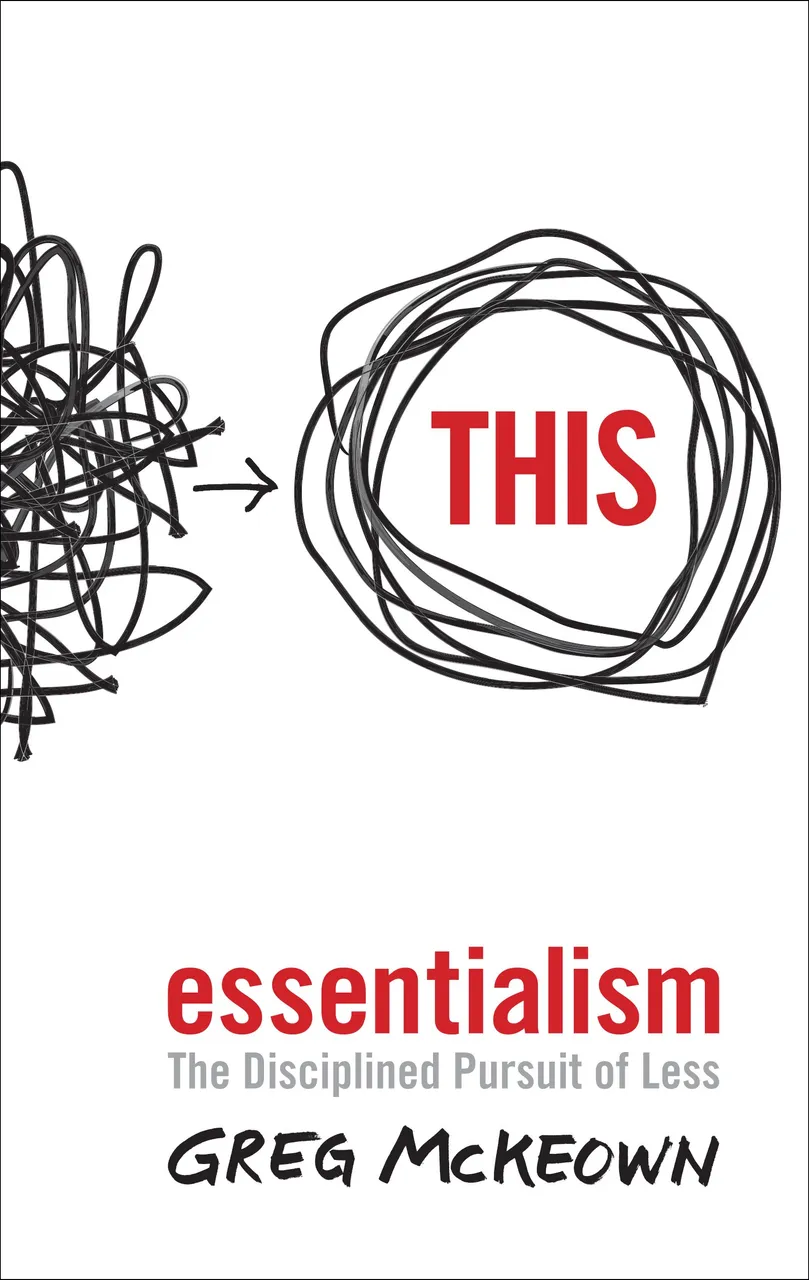
In K. Anders Ericsson’s famous study of violinists, popularised by Malcolm Gladwell as “the 10,000-Hour Rule,” Anders found that the best violinists spent more time practising than the merely good students.
The 10,000 hour rule is very famous by now. It was a study by Ericsson and popularised by Gladwell in his works. This is to become a true master at something: 10,000 hours of deliberate practice is required.
a less well-known finding from the same study: that the second most important factor differentiating the best violinists from the good violinists was actually sleep.
Sleep is so important to function well. I wasn't aware this was an aspect of the same study but it makes sense. Violinists - and anyone else for that matter - are more likely to be on their game following sufficient restful sleep. Not only short-term but in processing what they've learnt over time.
He likens sleep deficit to drinking too much alcohol
It can have similar effects. You're likely to be a bit groggy when you miss or have a bad night's sleep. Apparently it induces an impairment equivalent to having alcohol in your system.
If it isn’t a clear yes, then it’s a clear no.
Naval and Eric had something to say about that too in the last BookBabble. Author Mark Manson has also written on the subject. There's got to be a definite push or otherwise it's no-go.
Popular TED speaker Derek Sivers says, “No More Yes. It’s Either HELL YEAH! Or No”.
motivation and cooperation deteriorate when there is a lack of purpose.
Without purpose you tend to lose your way, so it's about having that goal which drives you to maintain everything else.
When we are unclear about our real purpose in life – in other words, when we don’t have a clear sense of our goals, our aspirations, and our values – we make up our own social games. We waste time and energies on trying to look good in comparison to other people.
We need clarity about who we really are. Without it we drift into unfavourable habits like comparisons and playing games to fit in and 'beat' other people. This drains us of vital resources and doesn't get us anywhere. We need to re-focus on ourselves, who we are and where we're heading.
“If we could be truly excellent at only one thing, what would it be?”
That's quite the question… but it does provide some clarity about what you really want. What would you want to be known for (money etc aside)?
“How will we know when we have succeeded?”
It needs to be measurable and you need to know if you've actually achieved the thing. There needs to be a marker and for it to be obvious where you are in relation to it.
“The main thing is to keep the main thing the main thing”
Keep coming back to this. Keep sight of the most important thing, and coming back to it when you drift off.
Sunk-cost bias
When we've put a certain amount of resources into a project and even though it's not going well, putting more and more into it. Reason being we've put all that effort/money into it already so we need to see it through, rather than facing facts and cutting our losses.
“status quo bias.”
A preference for maintaining your current state of affairs rather than changing them. Actively opposing things that may change the situation. It's much easier to stay still, and fear and uncertainty may be a driver here.
I SAW THE ANGEL IN THE MARBLE AND CARVED UNTIL I SET HIM FREE. —Michelangelo
Good ol' Michelangelo, he was a fine sculptor. The point is chipping away at all the stuff that doesn't belong to reveal the masterpiece that dwells beneath.
CUT OUT OPTIONS
This was discussed in Predictably Irrational (recently covered). About making decisions and cutting out options. We also discussed the paradox of choice in that post.
Stephen King has written, “To write is human, to edit is divine.”
Write drunk, edit sober is another quote about editing that I like. Not in a literal sense (although you can if you want ;)), but be more blasé about the writing and get it out there. Then refine it with 'sober' eyes and be a bit more methodical.
King is saying here that editing is where the real quality lies as that takes it from wild ideas to a more presentable piece.
“I must apologise: if I had more time I would have written a shorter letter.”
It takes time to whittle things down and remove the non essential. There is great skill in being concise; covering what is necessary and discarding what's not.
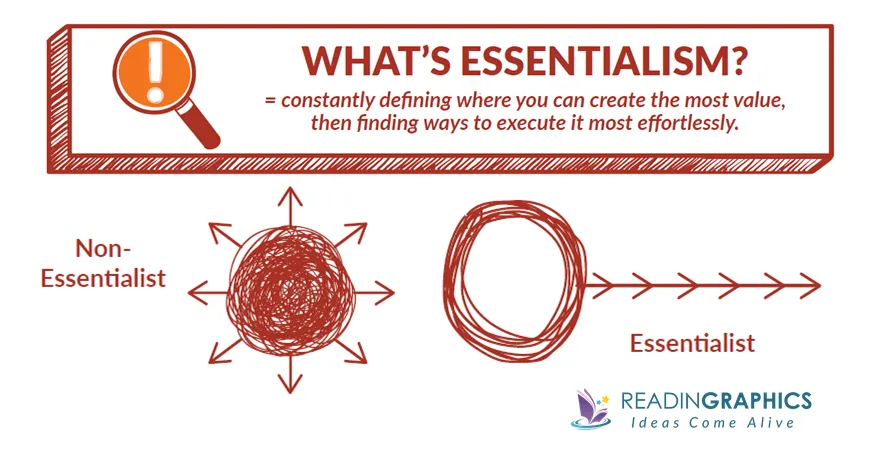
when people make their problem our problem, we aren’t helping them; we’re enabling them.
There's a time and a place for helping, but we just need to be aware that in some cases it's enabling. Plus misery loves company, so people group together to whinge rather than doing something to improve their lot.
Boundaries
Healthy boundaries are important. Good for you, but also everyone else as they know where they stand. People will appreciate them if done in a nice way, plus you're able to crack on with what's important.
EXECUTE
Get it done! Once you know what's necessary, now's the time for action and executing on those plans.
GIVE ME SIX HOURS TO CHOP DOWN A TREE AND I WILL SPEND THE FIRST FOUR SHARPENING THE AXE. —Attributed to Abraham Lincoln
Abe with some wisdom here. Preparation is the key point; getting everything set up and when it comes to actually doing the thing, it's just a case of… doing it.
“planning fallacy.”
Optimistic and dodgy predictions of how long things will take. Curve balls and the like are often not accounted for and things generally take longer.
TO ATTAIN KNOWLEDGE ADD THINGS EVERY DAY. TO ATTAIN WISDOM SUBTRACT THINGS EVERY DAY. —Lao-tzu
Another way of saying, add knowledge for sure, but to truly go deeper you need to remove any excess (and keep refining).
“What is the obstacle that, if removed, would make the majority of other obstacles disappear?”
There's quite often one big thing that can have a huge impact on other things if removed. This can also work on the flip-side - add something important and it emanates through everything else.
the two primary internal motivators for people are achievement and recognition for achievement.
Progress is the key. Any forward movement is an achievement in itself… getting some sort of recognition makes it more worthwhile.
the single most important is making progress in meaningful work
It can't be stressed enough. That's progress again, but it has to be meaningful (to you) or otherwise what's the point?
ROUTINE, IN AN INTELLIGENT MAN, IS A SIGN OF AMBITION. —W. H. Auden
Routine is vital and we always fall into one in one way or another. We may as well make it work for us. Doesn't have to be 'boring' but a case of doing certain things at certain times and developing good continuous habits. You know where you are with a solid routine and you can always be more spontaneous outside of that.
“What’s important now?”
What's the most important thing right now?
The ancient Greeks had two words for time. The first was chronos. The second was kairos.
Those Greeks. Chronos is measured and counted, while Kairos is lived and experienced. Chronos is more traditional, as in the units of time as we know them. Kairos refers to the way certain moments or seasons are more important or influential than others. A clock can't measure that.
Lao Tzu: “In work, do what you enjoy. In family life, be completely present.”
Being 100% in with what you're doing in a given situation. When you're working, make sure you enjoy it and throw yourself full force. When at home or in leisure time, be really there and make the most of it.
The Greeks had a word, metanoia, that refers to a transformation of the heart.
The Greeks are back! Changing one's mind, but perhaps a bit deeper than that.
whatever decision or challenge or crossroads you face in your life, simply ask yourself, “What is essential?” Eliminate everything else.
And that sums it all up: recognise the situation, decide what's important and then go ahead and act on those things with full force.
Thanks Greg! Anything Else?
The central premise of course is less is more. We continue to add more and more in pursuit of a more 'fulfilling' life but perhaps we need to do the opposite. Strip away the excess and leave us with only the core aspects that really matter to us and where we're heading.
Anything that helps guide us in this pursuit has to be a good thing, and this book is great to have in your arsenal to get to the central tenets of what makes you tick and moves you forward.
Essential reading ;)
First image my own, others linked to source
Check out the others in the series…
- SHOE DOG - Phil Knight
- CRUSHING IT - Gary Vaynerchuk
- FINDING ULTRA - Rich Roll
- WOODEN - John Wooden
- RELENTLESS - Tim Grover
- ON WRITING - Stephen King
- START WITH WHY - Simon Sinek
- THE CHIMP PARADOX - Steve Peters
- ELON MUSK - Ashlee Vance
- WAY OF THE WOLF - Jordan Belfort
- THE SUBTLE ART… - Mark Manson
- GORILLA MINDSET - Mike Cernovich
- THE 10X RULE - Grant Cardone
- FLOW - Mihaly Csikszentmihalyi
- THE GO-GIVER - Bob Burg & John D. Mann
- BE OBSESSED OR BE AVERAGE - Grant Cardone
- NEVER SPLIT THE DIFFERENCE - Chris Voss
- IKIGAI - Héctor García & Francesc Miralles
- THE 5 SECOND RULE - Mel Robbins
- YOU ARE THE PLACEBO - Dr. Joe Dispenza
- DEEP WORK - Cal Newport
- CREATIVE MISCHIEF - Dave Trott
- THE E-MYTH REVISITED - Michael E. Gerber
- THE PERFECT DAY FORMULA - Craig Ballantyne
- SO GOOD THEY CAN'T IGNORE YOU - Cal Newport
- ATOMIC HABITS - James Clear
- OUTWITTING THE DEVIL - Napoleon Hill
- CAN'T HURT ME - David Goggins
- 50 MARATHONS IN 50 DAYS - Dean Karnazes
- GREENLIGHTS - Matthew McConaughey
- THE GLADIATOR MINDSET - Adam Peaty
- OPEN: AN AUTOBIOGRAPHY - Andre Agassi
- THE 1% RULE - Tommy Baker
- THE 5 LOVE LANGUAGES - Gary Chapman
- THE BRAIN THAT CHANGES ITSELF - Norman Doidge
- THE WAR OF ART - Steven Pressfield
- PREDICTABLY IRRATIONAL - Dan Ariely
- BORN TO RUN - Christopher McDougall
- THE ALMANACK OF NAVAL RAVIKANT - Eric Jorgenson
- ESSENTIALISM - Greg McKeown
- EAT & RUN - Scott Jurek
- THAT WILL NEVER WORK - Marc Randolph
- THE SECRET RACE - Tyler Hamilton
- 12 RULES FOR LIFE - Jordan Peterson
- THE GREATEST SALESMAN IN THE WORLD - Og Mandino
- THE MAGIC OF THINKING BIG - David Schwartz
- THINKING, FAST AND SLOW - Daniel Kahneman
- LETTING GO - David Hawkins
- MAN'S SEARCH FOR MEANING - Viktor Frankl
- NEVER FINISHED - David Goggins